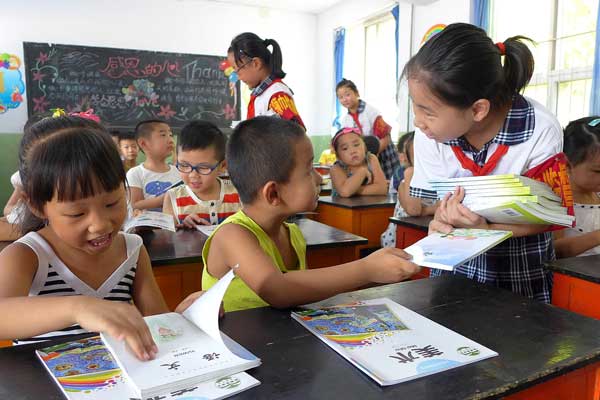Plan to teach pupils practical skills welcome
Updated: 2015-08-06 07:39
By Fang Zhou(China Daily)
|
|||||||||
 |
|
First-grade students receive new textbooks at a primary school in Handan, Hebei province. Hao Qunying for China Daily |
The fresh emphasis by education authorities on a curriculum aimed at improving students' practical skills is expected to shift the authorities' approach to China's controversial education model and promote all-round development of teenage students.
In a recent circular jointly issued by two agencies working for the betterment of teenagers and the Ministry of Education, the latter says a practical skill-related curriculum will be set for the last six years of students' nine-year compulsory education program. The curriculum will include housekeeping, cooking, handicraft, gardening and non-material cultural heritage, and schools will assign students homework like washing dishes and clothes, sweeping floors and sorting items.
According to a ministry official, the current education model that overemphasizes students' academic performance while ignoring the cultivation of their labor skills and practical abilities has prompted the authorities to shift their approach and opt for the new curriculum for the nine-year compulsory education. In view of worrisome problems inherent in the education model and among the majority of teenage students, most of whom are the only and spoilt children of their parents, the addition of a practical curriculum is welcome.
Because of the examination-oriented education model, many schools have worked out programs that focus on improving students' academic performance; only a few pay attention to the cultivation of students' practical abilities.
Even the courses that have been set on these lines have laid nominal emphasis on the issue. Moreover, they have usually been criticized both by teachers and students. On the other hand, parents usually urge their children to focus on studies, which they believe will help increase their scores in exams, get them admitted to top schools and increase their chances of getting better-paying jobs. Parents obsessed with high scores also try to keep their children away from housework because they believe it is irrelevant to their academic performance. In the process, they ignore the fact that every student needs to learn some skills and gain some knowledge to survive in today's fast-changing world.
The focus on improving academic performance through high scores and the lack of even the basic labor skills have turned our teenage students into "learning machines" who are adept at solving various kinds of mathematical problems but don't have the knowledge to take care of themselves. This education model, which ignores practical knowledge and work, has also given rise to the "high-score, low-ability" phenomenon among some students.
For example, there are many extreme examples of university students lacking the ability to wash clothes, even socks. Such students get their clothes washed and ironed in laundries or regularly send them home for their parents to do the needful. Due to this lack of practical knowledge they are ignorant about "labor consciousness" and, as a result, look down upon manual workers.
The aim of school education is not only to impart bookish knowledge to students. It is also to teach them the basic skills to better adapt to life and society. Teaching students the skills to do some practical work will not only help them overcome the hardships of life, but also prompt them to study harder to pursue higher goals in life.
At a time when most Chinese parents are inclined to do all the practical work for their single offspring at home, the school curriculum to teach some practical work skills to students is not only important but also necessary.
In order to achieve the expected results and prevent such curriculum from being reduced to just a decoration, the education authorities should change the current exam-oriented education model and consider putting it on par with other courses in the evaluation of students' performance for higher grades.
The author is a senior writer with China Daily.
Related Stories
Xiamen student crowned winner of Miss Universe China's Fujian stop 2015-07-27 15:48
Armless student teaches lesson in fortitude on way to law school 2015-07-22 07:54
Love for ailing Uygur student helps raise 250,000 yuan for treatment 2015-07-17 17:16
Student volunteers support Nanjing Week in Milan 2015-07-15 17:23
Today's Top News
Inspectors to cover all of military
Britons embrace 'Super Thursday' elections
Campaign spreads Chinese cooking in the UK
Trump to aim all guns at Hillary Clinton
Labour set to take London after bitter campaign
Labour candidate favourite for London mayor
Fossil footprints bring dinosaurs to life
Buffett optimistic on China's economic transition
Hot Topics
Lunar probe , China growth forecasts, Emission rules get tougher, China seen through 'colored lens', International board,
Editor's Picks

|

|

|

|

|

|







